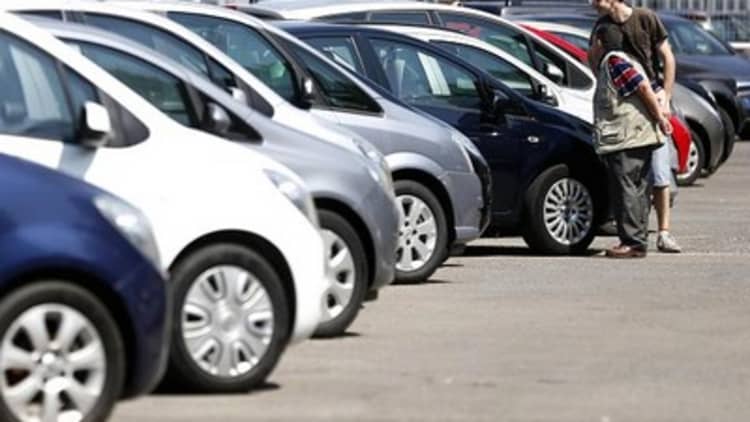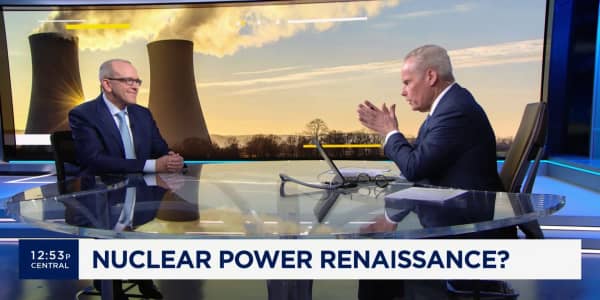
Booming U.S. car sales and a push by private equity investors are creating a renaissance in the market for auto loan-backed securities. Corporations like Apple, Google and 3M as well as institutional and insurance-industry investors have been looking for the promise of steady yields in exchange for limited risk.
But a panoply of investigations into lending practices for so-called subprime, or riskier, borrowers, coupled with concerns about the exits of some auto-finance company investors, have some market observers warning that trouble could lie ahead.
"When you lower your credit standards, eventually the bonds will default and they'll fail," said Chris Hentemann, a veteran asset-backed securities investor who runs the hedge fund 400 Capital Credit Opportunities. "So that's why we've decided to step aside."
Hentemann, 46, should know: He once ran the global structured product desk at Bank of America, which included asset-backed securities like those based on mortgage and car loans, and was there during the early stages of the credit crisis.
As a hedge fund manager, he typically looks for riskier, and therefore higher-yielding, credit investments than the 1 percent to 4 percent rates of return that auto loan-backed securities are currently offering. And even though Hentemann thinks the higher-graded portions of the auto securities are likely safe bets—and a better strategy for a cash-heavy corporations than simply leaving money on the sidelines—he still believes it's a bad point in the credit cycle to jump in for the first time.
Read MoreAuto leases hit high, buyers hunt for low payments
Year to date, $79 billion worth of auto securities have been issued, according to figures from Dealogic, and investors and underwriters say that the new-offering calendar appears robust. Two years ago, the market crossed the $100 billion mark for the first time since its peak of $108 billion in 2005. It hovered close to those levels in 2013.
And an increasing portion of those loans is of the subprime—or, based on the borrower's credit history, more likely to default—variety. Through the middle of 2014, about 29 percent of all the securities based on auto loans to individuals were classified subprime, a level 15 percent higher than during the same period last year, according to figures from Standard & Poor's.
In general, subprime auto security issuance has been climbing, sometimes dramatically year over year, since 2008 (except for 2013, when subprime auto securities fell slightly as a proportion of the overall market).
Read MoreMiss a payment? Good luck moving that car
Market watchers like Hentemann say that volume was driven by private equity investors in auto financing companies who wanted to drive up loan issuance, and therefore, revenue, even extending credit to borrowers who would be challenged in paying back their auto debt. Indeed, in recent years, Blackstone, Warburg Pincus, KKR and other sponsors piled into the auto-lending sector as sales soared.
But recent steps among private equity firms to cash out, including the initial public offering earlier this year of the lender Santander Consumer USA and a recent public share sale of Regional Management Corp., a smaller consumer lender, and reductions in exposure to auto-loan providers by other key players, have been a red flag in the eyes of some industry analysts.
"We should all think carefully about our investments in the same area that the private equity folks are selling," said Chris Gillock, a managing director at the Chicago deal advisory firm Colonnade Advisors who recently issued a warning note to clients about the subprime auto sector. "These folks spend a lot more time than the average person thinking about industries and analyzing data," he added, "so when they make a move, it's usually—not always, but usually—a pretty well-considered and sophisticated move."
U.S. regulators are also taking note. In August, both Santander Consumer and General Motors Financial Co. acknowledged receiving Justice Department subpoenas in connection with a probe over possible violations of civil-fraud laws. And the Consumer Financial Protection Bureau and the Securities and Exchange Commission have both stepped up their scrutiny of the auto-loan market.
Read More5 tips to get the best deal on a car loan
Despite the concerns, auto-backed securities remain popular with institutional investors and insurance companies—and have become an increasingly attractive destination for tech companies looking for a point or two of extra yield.
"Managing cash in-house and investing in ABS," or asset-backed securities, "is a tech phenomenon on the West Coast," said Amanda Magliaro, head of the ABS syndicate desk at Citigroup. Such securities, she added, often generate "what we call a flight to quality" for investors "when the stock market doesn't perform."
Magliaro adds that the asset-backed security investor base typically "is a universe of buyers that are looking to park cash; they're not necessarily looking to take risk."
Apple and 3M are investing actively in auto loan-backed securities, with 3M favoring only the highest investment-quality bonds, according to their financial filings and people familiar with the matter. Google has been doing so for at least two years, according to filings and published reports. (Spokesmen for all three companies declined to elaborate on what they're doing beyond the regulatory documents.)
And market players familiar with auto-backed securities insist that despite the investigations and the macro environment, the investments, particularly their AAA, or lowest-risk and lowest-yielding flavors, remain supersafe.
Read MoreThe rudest drivers in America
Many, in fact, used an old adage to sum up the attractiveness of auto loans versus their mortgage counterparts: "You can sleep in your car, but you can't drive your house."
In other words, people will pay off their car, which is a means to commute to work, buy supplies and even a source of temporary housing in times of crisis, before they'll pay off their home loans or certain other expenses.






